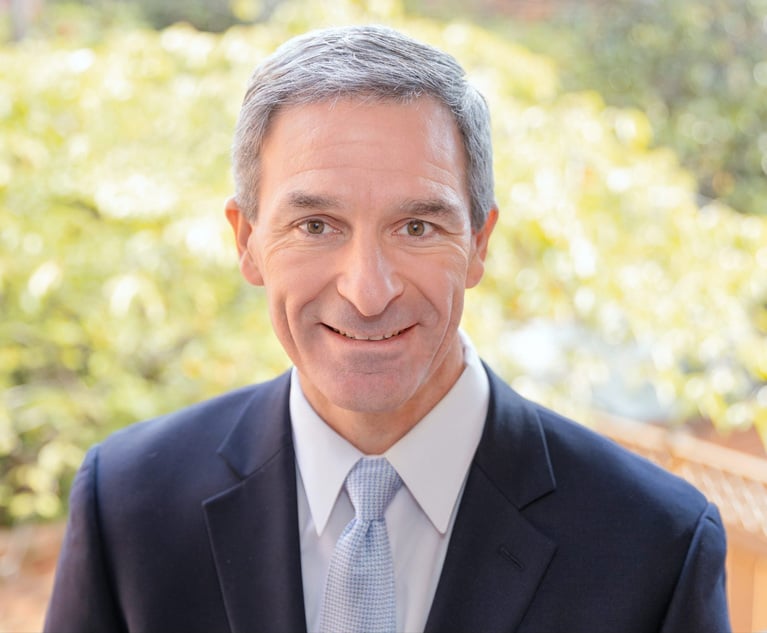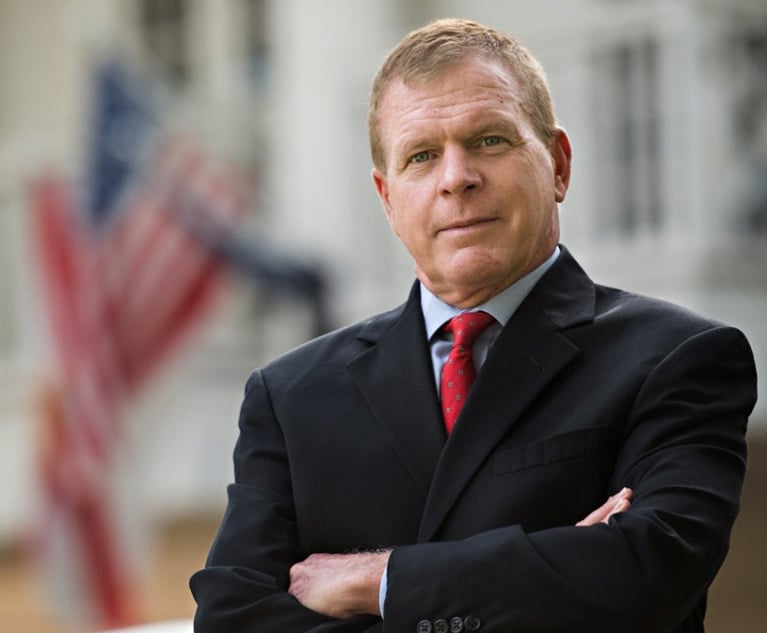Invasion of the Clerkship Snatchers? The Rise and Fall of the Federal Clerkship Training Academy
"I cannot imagine a scenario in which any self-respecting judge would allow an incoming law clerk to undergo top secret training."
October 25, 2018 at 12:22 PM
6 minute read
 Consultation with insurance lawyer and customer.
Consultation with insurance lawyer and customer.
Last week, New York Times reporter Adam Liptak caused a momentary firestorm across the legal community. Liptak reported that the Heritage Foundation had announced it was sponsoring a three-day Federal Clerkship Training Academy for graduating law students who would be clerking in the federal judiciary. It was not the idea that future law clerks would be trained prior to beginning their employment that caused the uproar; the outrage revolved around the type of training that would be provided as well as the secret nature around the training sessions.
According to the training academy's application, the academy was designed to prepare participants “to excel as clerks in the U.S. federal court system.” Attendees would not focus, however, on such mundane matters as deciphering the federal sentencing guidelines or drafting jury instructions. Instead, the cornerstone of this preparation would be teaching attendees originalist and textualist judicial philosophies.
Other academy details were a bit murky. While applicants were promised that “distinguished” federal appeals court judges and “prominent” law school professors would serve as their guides, the application materials contained no list of instructors. Nor were applicants told who was bankrolling the all-expenses-paid academy, except that “generous donors” were making “significant financial investments in each and every attendee.” What return on their investment these anonymous donors expected was not addressed.
What is clear, however, were the explicit requirements that attendees remain silent about the content of the training sessions. Specifically, a signed application meant that the participant agreed to “[k]eep strictly confidential, and not distribute to any other person, any written materials” from the academy. A plain reading of the text suggests the trainees could not even share these materials with the judges who would be subsequently employing them.
Moreover, the application stated that the training provided could not be used for any purpose “contrary to the mission or interest of the Heritage Foundation.” What the mission or interest of the Heritage Foundation was not specified in the application itself, although a basic familiarity with the organization itself is suggestive. Finally, participants were expected to “engage in reasonable effort to identify other individuals” who might benefit from future training academies.
Much of the information requested by the application is not surprising. Law school attended. Grade point average and class rank. Membership on law review or journals. Moot court or trial advocacy experience. Bar membership and prior clerkships. A bit more unusual, however, were the three essay topics: “Please describe your understanding of originalism,” “Please identify the United States Supreme Court Justice (past or present) whose jurisprudential philosophy and approach to judging you agree with most,” and “Please explain why you have chosen to do your upcoming clerkship, and how you intend to utilize the clerkship experience you gain in your future legal career.” One assumes that writing an ode to the late Justice William J. Brennan Jr. and the “living Constitution” would immediately disqualify a candidate.
Reaction to the news story was instantaneous and almost universally negative, with prominent law professors, social scientists and former governmental officials denouncing the training academy as tantamount to an indoctrination camp where new generations of conservative lawyers would be created and set loose on the legal world. Not only did commentators bemoan that the training academy would increase the political polarization of the men and women who clerked in the federal courts, but some darkly muttered that the lessons learned at the academy might help conservative law clerks wield substantive influence over judicial behavior. Within a day, the Heritage Foundation announced that that it was halting its plans to offer the training academy.
I have been researching and writing about law clerks for the last 15 years, with a special emphasis on how federal court clerks are selected and utilized. In my research, I examine how law clerk hiring practices have changed over time as well as the relationship between law clerk ideology and judicial decision-making. Given that law clerks routinely draft substantive orders and opinions in all levels of the federal courts, I have argued there is a real danger that judges have delegated too many responsibilities to their clerks and thereby opened the door to law clerk influence over judicial decision-making.
That being said, my own reaction to the training academy was more bemusement than outrage because of the essential nature of a clerkship. Patricia Wald, former chief judge of the U.S. Court of Appeals for the D.C. Circuit, once observed that “[t]he judge-clerk relationship is the most intense and mutually dependent one I know of outside of marriage, parenthood, or a love affair.” And she is right. Judges traditionally hire recent law school graduates to spend one to two years in their chambers. The clerks are full of energy and ideas, but they often lack the training, experience or wisdom to understand the complex issues which come before a federal court judge. Over the course of the clerkship, a judge teaches and mentors the clerk. They work long hours together. They share lunches and conversation. Many judges invite clerks into their homes for holidays and consider them members of their court family long after their clerkships have ended.
In short, I cannot imagine a scenario in which any self-respecting judge would allow an incoming law clerk to undergo top secret training. Nor would such a judge tolerate a law clerk who placed the interests of outside organizations or financial investors over those of the judge. To hire such clerks would undermine the fundamental nature of a clerkship, namely, a principal-agent relationship in which the agent is hired to carry out the wishes of the principal and rules are designed to prevent defection by the agent. And it would sow seeds of distrust which would prevent the best part of the clerkship from occurring, namely, the professional and personal bonds which form between clerk and judge. It is good that this ill-conceived idea has been abandoned.
Todd C. Peppers, a public affairs professor at Roanoke College, is the author or co-editor of three books about Supreme Court law clerks.
This content has been archived. It is available through our partners, LexisNexis® and Bloomberg Law.
To view this content, please continue to their sites.
Not a Lexis Subscriber?
Subscribe Now
Not a Bloomberg Law Subscriber?
Subscribe Now
NOT FOR REPRINT
© 2025 ALM Global, LLC, All Rights Reserved. Request academic re-use from www.copyright.com. All other uses, submit a request to [email protected]. For more information visit Asset & Logo Licensing.
You Might Like
View All


Restoring Antitrust: Returning to the Consumer Welfare Standard
Trending Stories
- 1States Accuse Trump of Thwarting Court's Funding Restoration Order
- 2Microsoft Becomes Latest Tech Company to Face Claims of Stealing Marketing Commissions From Influencers
- 3Coral Gables Attorney Busted for Stalking Lawyer
- 4Trump's DOJ Delays Releasing Jan. 6 FBI Agents List Under Consent Order
- 5Securities Report Says That 2024 Settlements Passed a Total of $5.2B
Who Got The Work
J. Brugh Lower of Gibbons has entered an appearance for industrial equipment supplier Devco Corporation in a pending trademark infringement lawsuit. The suit, accusing the defendant of selling knock-off Graco products, was filed Dec. 18 in New Jersey District Court by Rivkin Radler on behalf of Graco Inc. and Graco Minnesota. The case, assigned to U.S. District Judge Zahid N. Quraishi, is 3:24-cv-11294, Graco Inc. et al v. Devco Corporation.
Who Got The Work
Rebecca Maller-Stein and Kent A. Yalowitz of Arnold & Porter Kaye Scholer have entered their appearances for Hanaco Venture Capital and its executives, Lior Prosor and David Frankel, in a pending securities lawsuit. The action, filed on Dec. 24 in New York Southern District Court by Zell, Aron & Co. on behalf of Goldeneye Advisors, accuses the defendants of negligently and fraudulently managing the plaintiff's $1 million investment. The case, assigned to U.S. District Judge Vernon S. Broderick, is 1:24-cv-09918, Goldeneye Advisors, LLC v. Hanaco Venture Capital, Ltd. et al.
Who Got The Work
Attorneys from A&O Shearman has stepped in as defense counsel for Toronto-Dominion Bank and other defendants in a pending securities class action. The suit, filed Dec. 11 in New York Southern District Court by Bleichmar Fonti & Auld, accuses the defendants of concealing the bank's 'pervasive' deficiencies in regards to its compliance with the Bank Secrecy Act and the quality of its anti-money laundering controls. The case, assigned to U.S. District Judge Arun Subramanian, is 1:24-cv-09445, Gonzalez v. The Toronto-Dominion Bank et al.
Who Got The Work
Crown Castle International, a Pennsylvania company providing shared communications infrastructure, has turned to Luke D. Wolf of Gordon Rees Scully Mansukhani to fend off a pending breach-of-contract lawsuit. The court action, filed Nov. 25 in Michigan Eastern District Court by Hooper Hathaway PC on behalf of The Town Residences LLC, accuses Crown Castle of failing to transfer approximately $30,000 in utility payments from T-Mobile in breach of a roof-top lease and assignment agreement. The case, assigned to U.S. District Judge Susan K. Declercq, is 2:24-cv-13131, The Town Residences LLC v. T-Mobile US, Inc. et al.
Who Got The Work
Wilfred P. Coronato and Daniel M. Schwartz of McCarter & English have stepped in as defense counsel to Electrolux Home Products Inc. in a pending product liability lawsuit. The court action, filed Nov. 26 in New York Eastern District Court by Poulos Lopiccolo PC and Nagel Rice LLP on behalf of David Stern, alleges that the defendant's refrigerators’ drawers and shelving repeatedly break and fall apart within months after purchase. The case, assigned to U.S. District Judge Joan M. Azrack, is 2:24-cv-08204, Stern v. Electrolux Home Products, Inc.
Featured Firms
Law Offices of Gary Martin Hays & Associates, P.C.
(470) 294-1674
Law Offices of Mark E. Salomone
(857) 444-6468
Smith & Hassler
(713) 739-1250









